The Myth of Weekend Warriors
Dear Friends,
 A few weeks ago, I stood at Columbia Metropolitan Airport, watching as a contingent of South Carolina National Guard Soldiers returned from nine months of active duty in Europe. The scene was emotional — full of cheers, hugs, tears, and long-awaited embraces from families, friends, and fellow Soldiers.
A few weeks ago, I stood at Columbia Metropolitan Airport, watching as a contingent of South Carolina National Guard Soldiers returned from nine months of active duty in Europe. The scene was emotional — full of cheers, hugs, tears, and long-awaited embraces from families, friends, and fellow Soldiers.
These military police had spent the better part of the year supporting Army MP units across six different European countries. Their quiet, steadfast service was far from what most people imagined when they think of the National Guard.
service was far from what most people imagined when they think of the National Guard.
I later described the experience to a friend, who admitted he didn’t know the National Guard deployed so frequently, let alone to foreign countries. He assumed, as many do, that the Guard mostly drills on weekends, trains briefly in the summer, and helps during hurricanes, floods, and other natural disasters.
That common assumption, though understandable, misses the mark.
The Outdated “Weekend Warrior” Myth
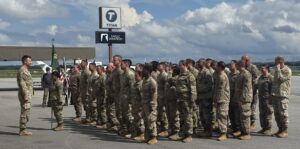 Yes, most National Guard members drill one weekend a month and attend a two-week annual training session. However, the idea that the Guard is a part-time force with limited responsibilities is a misconception. Some National Guard troops are full-time military professionals. Most, however, are Citizen-Soldiers who live and work in our communities but are trained and ready to serve when needed. Their lives can be upended at a moment’s notice, both here at home and around the globe.
Yes, most National Guard members drill one weekend a month and attend a two-week annual training session. However, the idea that the Guard is a part-time force with limited responsibilities is a misconception. Some National Guard troops are full-time military professionals. Most, however, are Citizen-Soldiers who live and work in our communities but are trained and ready to serve when needed. Their lives can be upended at a moment’s notice, both here at home and around the globe.
A Dual-Mission Force
What makes the National Guard unique in the U.S. military structure is its dual chain of command. Guard members take orders from two Commanders-in-Chief: the President of the United States and their state’s governor.
This dual authority allows state governments to respond swiftly to local needs. In South Carolina, nearly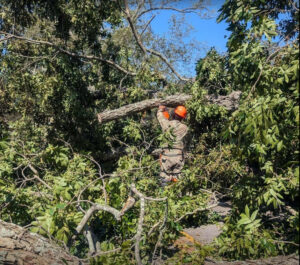 11,000 men and women serve in the Army and Air National Guard — making it one of the state’s largest and most versatile employers. Approximately 9,500 serve in the Army Guard and another 1,320 in the Air Guard.
11,000 men and women serve in the Army and Air National Guard — making it one of the state’s largest and most versatile employers. Approximately 9,500 serve in the Army Guard and another 1,320 in the Air Guard.
Because governors command the Guard in state status, it can be mobilized quickly for natural disasters, such as hurricanes and floods, or in response to public emergencies. During Hurricane Helene relief efforts, Guard troops were crucial to road clearing, debris removal, logistics, and public safety operations. In these cases, the federal government often foots the bill while the governor retains operational control.
Not Subject to Posse Comitatus
Another unique aspect of the National Guard is its ability to support law enforcement during times of civil unrest. Unlike federal military forces, which are restricted by the Posse Comitatus Act, the Guard can assist in domestic law enforcement missions when activated by a governor.
 This makes the Guard a particularly valuable tool for maintaining public order and delivering humanitarian assistance. Their versatility has earned them support across political lines, particularly in disaster relief and emergency response efforts.
This makes the Guard a particularly valuable tool for maintaining public order and delivering humanitarian assistance. Their versatility has earned them support across political lines, particularly in disaster relief and emergency response efforts.
The Guard is cost-effective. The federal government covers the cost of Guard training, salaries, and equipment for most operations. States only pay for the specific costs of in-state deployments. It’s a bargain, especially given the skill and discipline Guardsmen bring to the table.
A Federal Force as Well
At the federal level, the Guard is integrated into the U.S. military’s global strategy. As South Carolina’s Adjutant General, Major General Robin Stilwell, put it: “Our job is to be war fighters for the United States — we are the combat reserve of the U.S. Army and U.S. Air Force.”
General, Major General Robin Stilwell, put it: “Our job is to be war fighters for the United States — we are the combat reserve of the U.S. Army and U.S. Air Force.”
This mission has taken South Carolina Guardsmen to locations across the globe, including Kuwait, Afghanistan, Djibouti, Cuba, Romania, Germany, Poland, Kosovo, Colombia, Egypt, Iraq, Syria, and more. They serve alongside active-duty troops in critical combat and support roles.
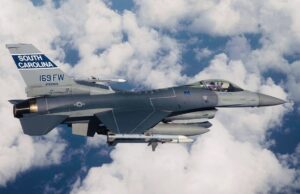 The South Carolina Air National Guard has maintained a consistent presence in global theaters for 75 years, dating back to the Korean War in 1950. From providing air defense in Europe during the Berlin Wall crisis in the 1960s to participating in numerous conflicts, including Desert Storm (1990), and Operations Enduring Freedom (2002), Iraqi Freedom (2003), Enduring Freedom (2010, 2012), CENTCOM-Jordan (2014), Korea (2017), Spartan Shield-Kuwait (2019), Freedom Sentinel-Saudi Arabia (2021), and Nobel Eagle (2023, 2025), our Airmen have served with distinction across the globe.
The South Carolina Air National Guard has maintained a consistent presence in global theaters for 75 years, dating back to the Korean War in 1950. From providing air defense in Europe during the Berlin Wall crisis in the 1960s to participating in numerous conflicts, including Desert Storm (1990), and Operations Enduring Freedom (2002), Iraqi Freedom (2003), Enduring Freedom (2010, 2012), CENTCOM-Jordan (2014), Korea (2017), Spartan Shield-Kuwait (2019), Freedom Sentinel-Saudi Arabia (2021), and Nobel Eagle (2023, 2025), our Airmen have served with distinction across the globe.
Current Deployments
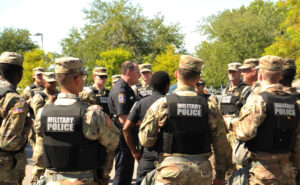 At this moment, 200 members of the S.C. National Guard are deployed to Washington, D.C., at the request of the Pentagon. They support local law enforcement and work with DHS/ICE. Governor Henry McMaster approved the deployment under a “Title 32” status — meaning the troops are federally funded but still under state control. This allows the Governor to recall them in the event of an emergency at home.
At this moment, 200 members of the S.C. National Guard are deployed to Washington, D.C., at the request of the Pentagon. They support local law enforcement and work with DHS/ICE. Governor Henry McMaster approved the deployment under a “Title 32” status — meaning the troops are federally funded but still under state control. This allows the Governor to recall them in the event of an emergency at home.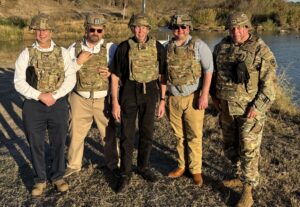
Two companies of S.C. Guardsmen are deployed along the Texas-Mexico border, helping secure an 80-mile stretch near Laredo. Along with several of my colleagues, I visited the 250 Soldiers in January, soon after they began their year-long mission. They will return shortly before Thanksgiving.
 In July 2023, along with several other Representatives, I visited our homegrown Soldiers who were taking part in Operation Lone Star. Those Guardsmen were standing in the breach, serving on the Texas/Mexico border at Eagle Pass, Texas. At the time, it was the epicenter of the illegal border invasion. Our Soldiers stood vigil, protecting our southern border, under the blistering sun with a heat index of 115 degrees.
In July 2023, along with several other Representatives, I visited our homegrown Soldiers who were taking part in Operation Lone Star. Those Guardsmen were standing in the breach, serving on the Texas/Mexico border at Eagle Pass, Texas. At the time, it was the epicenter of the illegal border invasion. Our Soldiers stood vigil, protecting our southern border, under the blistering sun with a heat index of 115 degrees.
Presently, the S.C. Guard is providing Air Defense support in the Middle East. These Soldiers are so critical that they got extended when things got hot with Iran this summer. They will return home soon. Meanwhile, the
Engineer Brigade, headquartered in Newberry, will soon deploy to the Middle East.
Our state’s Cyber Battalion has deployed twice for yearlong deployments in support of the U.S. Army’s CYBERCOM. Additionally, S.C.’s National Guard Air Defenders have been rotating approximately every three years since 9/11 to the National Capital Region to defend the airspace over Washington, D.C.
Returning to Civilian Life
When deployments end, Guardsmen face the challenge of reintegrating into civilian life. Thankfully, federal law protects their jobs and prohibits discrimination based on military service. Employers are legally required to reinstate service members upon their return, and many go further by offering flexibility, emotional support, and additional benefits.
Guard families can nominate outstanding employers for the Patriot Award, which honors exceptional support before, during, and after deployments. Each year, the U.S. Secretary of Defense recognizes 15 companies nationwide with the Employer Support Freedom Award—the highest honor given to supportive employers of Guard and Reserve personnel.
The National Guard also offers education and financial benefits, including reduced tuition at many public universities in South Carolina, up to $50,000 toward federal student loan repayment, enlistment and re-enlistment bonuses up to $20,000, and affordable healthcare and life insurance options.
Just as important, the Guard invests in the well-being of families left behind during deployments. Soldier and Family Readiness Specialists help maintain effective communication, offer emotional support, and connect families with resources. These networks ensure that families don’t face the challenges of service alone.
Aiken County Impact
In May, ground was broken at USC Aiken for two major S.C. National Guard facilities: the Cyber Integration Center and the Readiness Center. The $45 million investment is the largest single-site project in the Guard’s history.
In my remarks that day, I called the project a vital step in protecting critical infrastructure and enhancing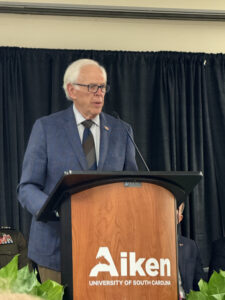
 cybersecurity across the region, as Aiken County is not immune to cyberattacks. I cited high-profile targets, such as the Savannah River Site, Meta, and other large industries.
cybersecurity across the region, as Aiken County is not immune to cyberattacks. I cited high-profile targets, such as the Savannah River Site, Meta, and other large industries.
The Cyber Integration Center will drive workforce development, innovation, and economic growth through partnerships with USC Aiken, the Savannah River Site, and the local business community. The university’s leading role in connecting cyber assets across South Carolina and Georgia is helping establish our region as a hub for growing cybersecurity and STEM industries.
“Always Ready, Always There”
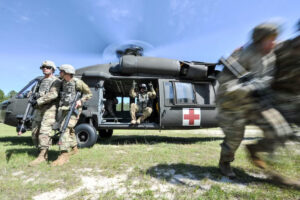 The National Guard’s motto — “Always Ready, Always There”— has never been more accurate. Guard members are being activated at unprecedented rates, for service both at home and abroad. They have become an essential part of America’s defense, homeland security, disaster response, and civil support.
The National Guard’s motto — “Always Ready, Always There”— has never been more accurate. Guard members are being activated at unprecedented rates, for service both at home and abroad. They have become an essential part of America’s defense, homeland security, disaster response, and civil support.
The next time you see a Guardsman in uniform or hear about a deployment, remember they’re not just weekend warriors. They are our neighbors who answer the call — anytime, anywhere.
Their sacrifice is real. Their service is vital. And their story deserves to be told.

PHOTO OF THE WEEK
HANDS-FREE IS HERE! This Monday, September 1, S.C. state law will require drivers to put down their phones and focus on driving.
At the bill signing ceremony, I told those gathered, “There are life-and-death reasons to put down the phone. Just a few seconds of distraction can end in tragedy. Through years of education and advocacy, our culture has come to view drunk driving as unacceptable. Yet AAA warns that distracted driving is even deadlier—up to six times more dangerous—because it’s like driving blind. I hope that distracted driving will soon carry the same stigma as DUI: reckless, dangerous, and completely intolerable.” Learn more about the new law at SCDPS.


